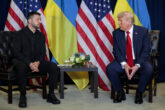March 11, 2022
The World That Putin Has Made
On Feb. 4, just weeks before he would invade Ukraine, Vladimir Putin went to the opening ceremony of the Winter Olympics in Beijing. Sitting alone, the Russian president appeared to close his eyes as the Ukrainian team entered. By the end of the month, he would threaten the country’s independent existence.
The Olympics wasn’t the only item on Mr. Putin’s agenda in Beijing. He held a high-profile summit meeting with Chinese leader Xi Jinping, in which the two pledged friendship and solidarity. To sum up their vision for what such a partnership could achieve, they issued an expansive joint manifesto.
By attacking Ukraine, Vladimir Putin may have brought about what he wanted least: a galvanized West, determined to act together to preserve a liberal world order
The world they sought, the statement said, would be ordered very differently than in the past, and China and Russia would cooperate with “no limits” to assume their rightful places in it. They would forge an “international relations of a new type,” multipolar and no longer dominated by the United States. There would be no further NATO enlargement, no color revolutions, no globe-spanning U.S. missile defense system, no American nuclear weapons deployed abroad. Actors “representing but the minority on the international scale”—that is, the U.S. and its allies—might continue to interfere in other states and “incite contradictions, differences and confrontation,” but Beijing and Moscow together would resist them.
Read the full article from The Wall Street Journal.
More from CNAS
-
Transatlantic Security / Middle East Security
The Russia-Iran Partnership: A Geopolitical Balancing ActIt has been almost a year since Russia and Iran signed their comprehensive strategic partnership. That deal established a 20-year partnership between the two countries coverin...
By Andrea Kendall-Taylor & Jim Townsend
-
Defense / Transatlantic Security
Ukraine’s Catch-22 MomentThis article was originally published in the Financial Times. In Joseph Heller’s wartime classic, Catch-22, the protagonist Yossarian seeks out the US army surgeon Doc Daneeka...
By Franz-Stefan Gady
-
Transatlantic Security / Middle East Security / Energy, Economics & Security
Sanctions Aren’t Enough to Shut Down the Moscow-Tehran Black Market for WarThe geographic scope and extent of Iranian-Russian cooperation highlights the failure of traditional sanctions to prevent Moscow and Tehran from seeking key components like ch...
By Delaney Soliday
-
What’s Driving President Trump’s New Confidence in Ukraine’s War Effort
President Trump dramatically declared on social media that he now believes that Ukraine can reclaim all its land from Russia, which he described as a paper tiger. From the Ova...
By Richard Fontaine




